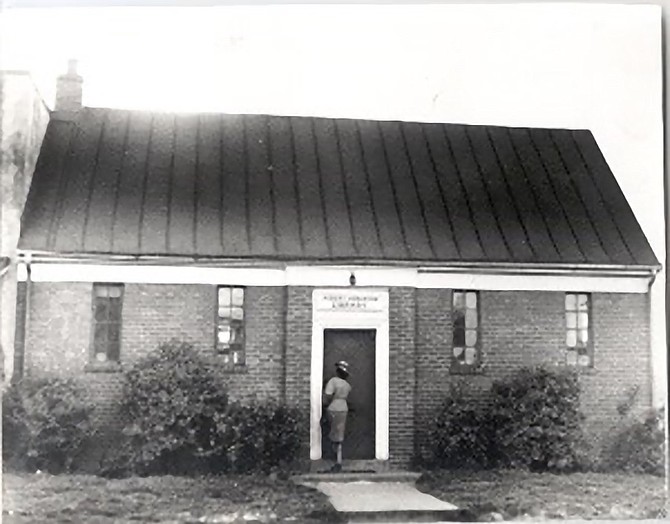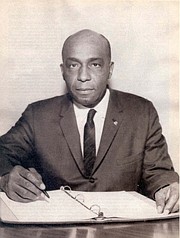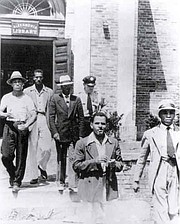The Robert H. Robinson Library was opened for African Americans at the corner of Wythe and N. Alfred Street on April 24, 1940, in order to maintain the Kate Waller Barrett Library as a whites-only institution. The Alexandria Library system did not begin to integrate until 1959 with full integration taking place in July of 1962. The building is now the home of the Alexandria Black History Museum. Photo/Alexandria Library
It was a peaceful protest, virtually ignored by newspapers across the country. Yet on Aug. 21, 1939, five African American men walked through the doors of the “whites only” Alexandria library in what was one of the earliest protests of the Civil Rights era. A display at the Barrett Branch Library, site of the protest, opened Aug. 16 to mark the 82nd anniversary of the event and honor those who changed the course of the city’s history.
Originally called the Alexandria Library, the present-day Barrett Branch Library on Queen Street was built in 1937 to serve the city’s white residents. African American residents were denied access even though their tax dollars helped finance the library, forcing those interested in reading to travel to Richmond or Washington, D.C., to use libraries there.
William “Buddy” Evans was just 19 years old when he agreed to participate in the protest orchestrated by Samuel W. Tucker, a young attorney determined to establish equal access to community resources. Evans was joined by Tucker’s younger brother Otto, 22; Edward Gaddis, 21; Morris L. Murray, 22; and Clarence "Buck" Strange, 21. One by one, each entered the library and requested a library card. When they were refused, they selected a book and sat down to read in silence.
A few blocks away, Tucker waited in his law office for word on the protest. When a panicked library clerk called the police, Tucker called the media and by the time the five men were escorted out of the building, a crowd of more than 300 had gathered outside.
The five were arrested and charged with disorderly conduct, even though witnesses testified the men were quiet and orderly during their time in the library. Tucker defended the men at trial and the charges were dropped after the arresting officer admitted the men had been arrested for their race and not their behavior.
Tucker used the protest to file a lawsuit to end the exclusion of African Americans from the public library. While a final ruling was never entered in the case, the judge found that no regulation limited the library's use to whites; it was open to Alexandria residents or taxpayers.
Despite the ruling, rather than allow black readers into the library, City Council appropriated funds to build a "colored branch" of the library, which opened in 1940 at the corner of Wythe and North Alfred streets. Named for a freed slave and beloved Alexandria pastor, the Robert H. Robinson Library was constructed at half the cost of the Alexandria Library, had shorter hours and was filled with secondhand books.
When invited to apply for a library card at the Robinson Library, Tucker refused to settle for the city’s “separate but equal” solution, saying, “I refuse and will always refuse to accept a card to be used at the library to be constructed and operated at Alfred and Wythe Streets in lieu of [a] card to be used at the existing library on Queen Street for which I have made application."
It wasn’t until the 1950s that Alexandria’s libraries were finally integrated. The Robinson Library closed in 1962 and today is the home of the Alexandria Black History Museum. The groundbreaking sit-in is chronicled in a documentary called “Out of Obscurity,” and copies are available to borrow from the library.
On Thursday, Aug. 19 at 7 p.m., Library Director Rose Dawson will interview Matt Spangler, creator of the "Out of Obscurity" documentary about the 1939 Alexandria Library Sit-In, as part of a virtual presentation commemorating the sit-in. An excerpt of the documentary will be shown at the start of the program.
To learn more or to register, visit http://www.alexlibraryva.org/1939-sit-in.


